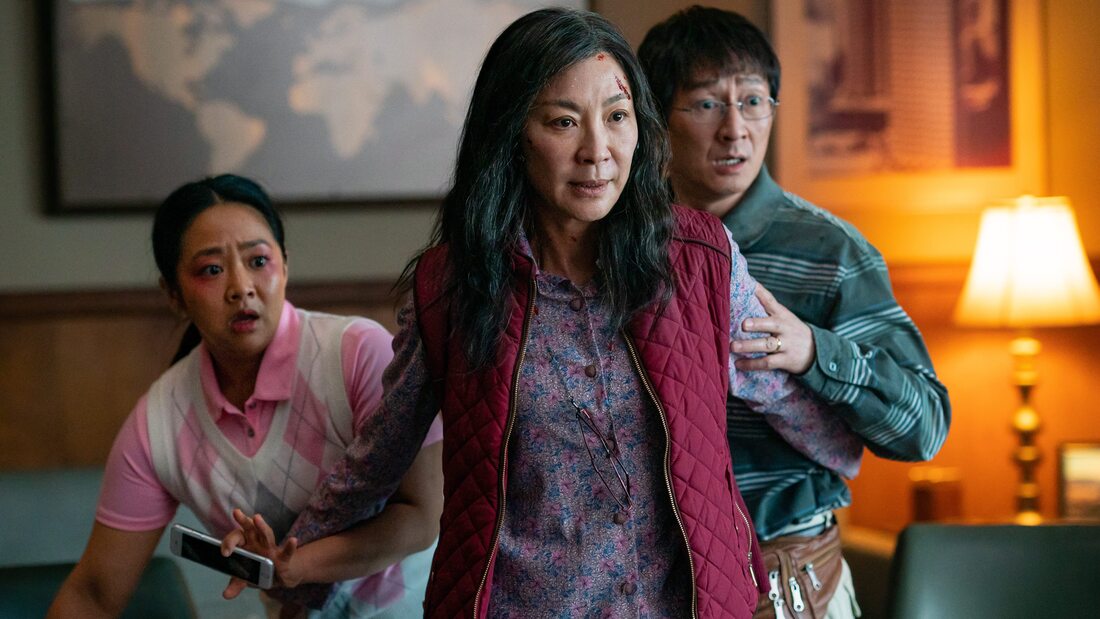This hectic domestic drama gives way to the endless scope of the multiverse when the Wang’s head to the IRS office for an appointment with agent Dierdre Beaubierdre (Jamie Lee Curtis). The body of Waymond is suddenly taken over by a version of him in a different universe, and he pulls Evelyn into a closet for an exposition dump. The version of Evelyn that he knows is a groundbreaking scientist who discovered a way for people to travel between different versions of themselves. Within that universe, scientist Evelyn used Joy as a guinea pig in her research and inadvertently gave her the ability to live in all versions of herself instantaneously. This Joy, referred to as Jobu Tabaki, has been picking off Evelyns one by one, and in the meantime, has created a device that could destroy the multiverse. He teaches her how to move between universes and instantly learn the skills of different versions of herself, but it’s not long before Jobu Tabaki finds her way to the universe of the film and starts wreaking havoc.
The test of the film is if this one small scale family story, and the mother-daughter division of it that gradually takes over the last act, can stay relevant against the literally infinite playground that the film opens up. There’s a version of this film that quarters its budget and shears off all of the metaphysical stuff, and is better for it. For all of the imagination of the different universes that the film takes place in, it ultimately pulls focus from the compelling family story at its center. Yeoh is always cast as the best cop, the best spy, the best martial artist warrior, or as she ages, the wisest mentor, and while she’s a capable and believable action star, they don’t stretch her abilities like this film does. Expository Waymond calls her the worst Evelyn in the multiverse thanks to her deep mediocrity and reflexive caution, and it’s to Yeoh’s great credit that someone with all of her gravitas can sell this as being a harsh but accurate description. Quan’s a charming gladhander, Hsu’s a sullen 20-something, and Curtis is having the time of her life as an imperious bureaucrat in a fat suit. Seeing this family try to reconcile their regrets over the course of a make-or-break day is enough of a story for a strong film.
The multiverse angle informs the family drama by literally presenting the paths not taken for Evelyn and Waymond, but it mostly functions as a way to hop between genres and show off some slapstick action. Jobu Tabaki has goons and so does scientist Evelyn’s father, who’s on his own journey to wipe out Joy’s and thus cut off Jobu Tabaki from those Joy-less (get it) universes. Default Evelyn is just a dry cleaner, but somewhere in the multiverse, she’s an expert sign-spinner or living the life of Yeoh as a Hong Kong action star. Daniels can’t put Yeoh in their movie without showing off her gift for fight choreography. Their irreverent humor also gets a workout whenever a character has to access a different universe. This can be done by doing something statistically improbable, which, amongst other examples, gives the butt-plug-shaped awards on Dierdre’s desk a chance to return to the frame. As the film starts to physically visit different universes, Daniels ape a steamy Wong Kar-wai romance and make an intimate short about Evelyn and Dierdre as domestic lesbians who also happen to have hot dog fingers. The deliciously villainous Jobu Tabaki keeps showing up in these and other universes in increasingly deranged outfits, ensuring the film a costuming Oscar alongside an editing one and whatever else this very strange film manages to stir up come awards season.
Throughout, that Rick and Morty shadow doesn’t get outrun. As the film reveals its central stakes underneath a layer of ketchup, raccoons, and bagels is the same dilemma that show presents. Every scientific advancement pushes humanity one step closer to realizing that the universe is not for us, that it would continue without us, that the highest-achieving human spent their whole lives on an insignificant rock in an insignificant corner of an insignificant galaxy. The multiverse shrinks the scale down even further, adding another layer of unknowable vastness. If that idea is engaged with on its face and not dismissed in a haze of religious hubris, then it’s either freeing because nothing matters or crushing because nothing matters. That’s what consciousness is: reconciling cosmic meaninglessness with hyperlocal meaning. Everything Everywhere All At Once gets points for engaging but in this viewer’s case, it’s preaching to a choir who revels in their meaninglessness and resulting freedom from anxiety and ambition. Not only Harmon and Roiland, but several of my favorite scientific authors like E. O. Wilson and Carl Sagan write about this, so it’s nice that the Daniels can piggyback on their work but I’ve heard it all before.
None of that precludes a different viewer from taking great meaning from this film. In the weeks between the film’s release and my seeing it, Everything Everywhere All At Once was the subject of rarified praise and pictures of families outside theaters barely able to catch their breath. Repeat viewings might very well deepen my appreciation of Daniels’ visually dense film. I might hit harder on the immigrant thread or the depression one or the romantic one. As is, the toe starts tapping during exposition dumps while big moments the Daniels are dead certain are going to level audiences land harmlessly at my feet. The film’s ambition and breadth cannot be denied, nor can the strength of the core cast. Everything Everywhere All At Once’s visceral pleasures are many, but it’s intellectual ones have been experienced long ago. B+

 RSS Feed
RSS Feed